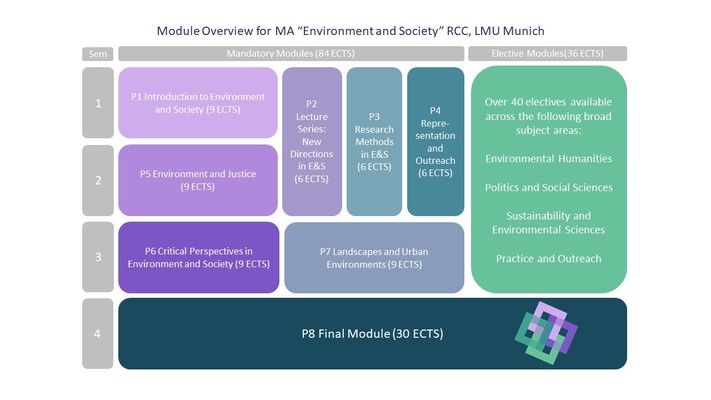Core Modules
The program’s core modules are designed to introduce students to a broad range of topics and approaches related to environment and society. All core modules are taught in English. Many of the courses in the MA Environment & Society include hands-on exercises, field trips, and fieldwork.
Year 1:
- P1: An interdisciplinary Introduction to Environment and Society familiarizes students with histories of the human relationship with the environment, as well as key debates and theories in the environmental humanities. Besides classroom learning, the course includes hands-on activities and field trips in and around Munich.
- P2: New Directions in Environment and Society introduces students to scholarship and practical work related to new approaches, current issues, and pressing themes regarding environment and society.
- P3: In Research Methods in Environment and Society, students learn about interdisciplinary methods, ethics, and approaches used in the environmental humanities and qualitative social sciences, and how to apply them.
- P4: Representation and Outreach introduces students to various means of communicating environmental topics through writing and visual presentation. Students practice various methods of environmental communication aimed at different audiences, including digital media formats, such as podcasts or blogs.
- P5: In Environment and Justice, students explore the ways in which contemporary global environmental challenges raise questions of justice. Who is most affected by climate change? Is environmentalism exclusively for the rich? Why do some environmental dangers receive more attention in the media than others?
Year 2:
- P6: Critical Perspectives in Environment and Society digs deeper into theoretical discussions in the environmental humanities, such as ecofeminism, multi-speciesism, and other forms of environmental philosophy and ethics. Students get the chance to explore critical approaches that they will use in their master’s thesis.
- P7: Landscapes and Urban Environments explores ways in which humans have made and unmade environments in their urban surroundings and beyond. It introduces students to the ways in which humans have shaped the built environment and how in turn the built environment has contributed to shaping human history. The course also allows students to think about inhabiting the environment in new and surprising ways.
- P8: In the fourth semester, students work on a master’s thesis related to a topic of their choice.
The overview of the program's core modules in each semester, as well as the broad disciplinary categories in which electives can be taken, can be seen in the image below:


